
 (732) 246-1377
(732) 246-1377
 (732) 246-1377
(732) 246-1377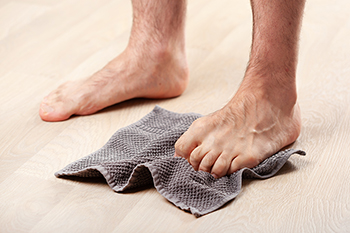
In the realm of overall well-being, foot health plays a pivotal role, and is often overlooked. Foot exercises, a powerful yet underappreciated tool, hold the potential to enhance both physical comfort and agility. These exercises come in various forms, from simple toe curls and arch stretches to more dynamic movements such as calf raises and ankle circles. Performing foot exercises can improve blood circulation, strengthen muscles, and enhance flexibility. This is successful in contributing to better balance and posture. The importance of foot exercises extends beyond the feet themselves, as they can alleviate strain on knees, hips, and lower back. It is beneficial to Incorporate foot exercises into a regular fitness regimen, which translates into a natural approach to health. If you would like to learn about additional foot exercises, it is suggested that you consult with a podiatrist who can provide you with useful tips.
Exercising your feet regularly with the proper foot wear is a great way to prevent injuries and build strength. If you have any concerns about your feet, contact one of our podiatrists from Livingston Footcare. Our doctors can provide the care you need to keep you pain-free and on your feet.
Exercise for Your Feet
Exercise for your feet can help you gain strength, mobility and flexibility in your feet. They say that strengthening your feet can be just as rewarding as strengthening another part of the body. Your feet are very important, and we often forget about them in our daily tasks. But it is because of our feet that are we able to get going and do what we need to. For those of us fortunate enough to not have any foot problems, it is an important gesture to take care of them to ensure good health in the long run.
Some foot health exercises can include ankle pumps, tip-toeing, toe rises, lifting off the floor doing reps and sets, and flexing the toes. It is best to speak with Our doctors to determine an appropriate regimen for your needs. Everyone’s needs and bodies are different, and the activities required to maintain strength in the feet vary from individual to individual.
Once you get into a routine of doing regular exercise, you may notice a difference in your feet and how strong they may become.
If you have any questions please feel free to contact our office located in North Brunswick, NJ . We offer the newest diagnostic and treatment technologies for all your foot and ankle needs.
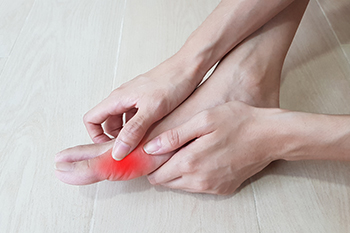
Gout is a type of arthritis that often affects the joints of the big toe, and is caused by the accumulation of uric acid crystals. There are four distinct stages of gout. The first stage, known as asymptomatic hyperuricemia, is characterized by high levels of uric acid in the blood without any noticeable symptoms. The second stage is acute gout that occurs when uric acid forms crystals which begin to deposit in the joints. This can lead to sudden and severe pain, swelling, and redness. If left untreated acute gout can progress to the third stage, known as intercritical gout, or the interval between gout attacks. During this phase, patients can experience periods of remission where symptoms subside, but it is essential to maintain proper management and lifestyle changes to prevent future flare ups. The final stage is chronic tophaceous gout, which occurs after repeated gout attacks. In this stage, large uric acid crystal deposits called tophi, can develop beneath the skin surrounding the joints and in other tissues. Tophi can lead to joint damage and deformities. Early detection and appropriate management are key to preventing the progression of gout. If you believe you have gout, it is suggested that you make an appointment with a podiatrist for treatment options.
Gout is a painful condition that can be treated. If you are seeking treatment, contact one of our podiatrists from Livingston Footcare. Our doctors will treat your foot and ankle needs.
What Is Gout?
Gout is a form of arthritis that is characterized by sudden, severe attacks of pain, redness, and tenderness in the joints. The condition usually affects the joint at the base of the big toe. A gout attack can occur at any random time, such as the middle of the night while you are asleep.
Symptoms
Risk Factors
Prior to visiting your podiatrist to receive treatment for gout, there are a few things you should do beforehand. If you have gout you should write down your symptoms--including when they started and how often you experience them, important medical information you may have, and any questions you may have. Writing down these three things will help your podiatrist in assessing your specific situation so that he or she may provide the best route of treatment for you.
If you have any questions, please feel free to contact our office located in North Brunswick, NJ . We offer the newest diagnostic and treatment technologies for all your foot care needs.
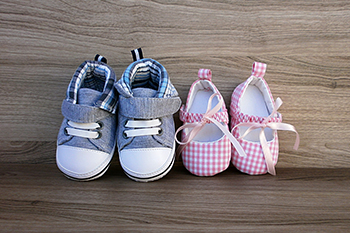
Most experts recommend letting babies go barefoot until they are getting ready to walk. However, finding the right shoes for their first steps can be confusing. The first concern is choosing the right size shoes for your toddler’s feet, and with an increase in age, the shoe size may change frequently. One way to determine the correct size is by inserting the pinky finger between the heel of the shoe and the child’s ankle. It should be snug. Then press the tip of the shoe while the baby is standing. There should be about half an inch of space. Next, choose shoes that are made of lightweight materials and are flexible. Shoes that are easy to put on and take off are desired, along with washability. It is thought that toddlers will need a new pair of shoes every two to three months. Hand-me-down shoes are discouraged as each child has a different foot structure. For additional guidance on choosing walking shoes for your child, it is suggested that you make an appointment with a podiatrist.
Making sure that your children maintain good foot health is very important as they grow. If you have any questions, contact one of our podiatrists of Livingston Footcare. Our doctors can provide the care you need to keep you pain-free and on your feet.
Keeping Children's Feet Healthy
Having healthy feet during childhood can help prevent medical problems later in life, namely in the back and legs. As children grow, their feet require different types of care. Here are some things to consider...
Although babies do not walk yet, it is still very important to take care of their feet.
Avoid putting tight shoes or socks on his or her feet.
Allow the baby to stretch and kick his or her feet to feel comfortable.
As a toddler, kids are now on the move and begin to develop differently. At this age, toddlers are getting a feel for walking, so don’t be alarmed if your toddler is unsteady or ‘walks funny’.
As your child gets older, it is important to teach them how to take care of their feet.
Show them proper hygiene to prevent infections such as fungus.
Be watchful for any pain or injury.
Have all injuries checked by a doctor as soon as possible.
Comfortable, protective shoes should always be worn, especially at play.
If you have any questions please feel free to contact our office located in North Brunswick, NJ . We offer the newest diagnostic and treatment technologies for all your foot and ankle needs.

Volleyball players commonly experience foot injuries due to the fast-paced and dynamic nature of the sport. Sprained ankles and twisted knees frequently occur, often resulting from sudden stops, starts, and side-to-side movements on the court. Additionally, repetitive jumping and landing can lead to conditions like plantar fasciitis, stress fractures, and Achilles tendonitis. Immediate relief for these types of injuries includes taking a break from volleyball play, resting the affected foot, and elevating it as often as possible. If you have more severe injuries or those that worsen over time, it is suggested that you consult with a podiatrist for care. This foot and ankle expert can accurately diagnose the problem and provide appropriate treatment so that you can return to the game as quickly as possible.
Sports related foot and ankle injuries require proper treatment before players can go back to their regular routines. For more information, contact one of our podiatrists of Livingston Footcare. Our doctors can provide the care you need to keep you pain-free and on your feet.
Sports Related Foot and Ankle Injuries
Foot and ankle injuries are a common occurrence when it comes to athletes of any sport. While many athletes dismiss the initial aches and pains, the truth is that ignoring potential foot and ankle injuries can lead to serious problems. As athletes continue to place pressure and strain the area further, a mild injury can turn into something as serious as a rupture and may lead to a permanent disability. There are many factors that contribute to sports related foot and ankle injuries, which include failure to warm up properly, not providing support or wearing bad footwear. Common injuries and conditions athletes face, including:
Sports related injuries are commonly treated using the RICE method. This includes rest, applying ice to the injured area, compression and elevating the ankle. More serious sprains and injuries may require surgery, which could include arthroscopic and reconstructive surgery. Rehabilitation and therapy may also be required in order to get any recovering athlete to become fully functional again. Any unusual aches and pains an athlete sustains must be evaluated by a licensed, reputable medical professional.
If you have any questions please feel free to contact our office located in North Brunswick, NJ . We offer the newest diagnostic and treatment technologies for all your foot and ankle needs.
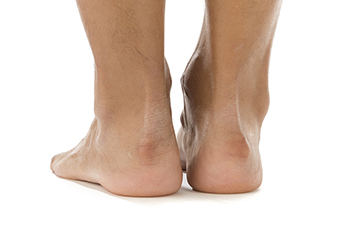
Haglund's deformity is a foot abnormality where the heel bone and soft tissues develop an enlarged bony section at the Achilles insertion, causing heel pain and swelling. It is linked to retrocalcaneal bursitis, often referred to as "pump bump" or "winter heel" due to pressure from pump-style shoes. This condition commonly affects runners and women aged 15 to 35, particularly those who wear high heels. Factors such as genetics, high arches, tight Achilles tendon, and walking on the outer heel edge contribute to its formation. Wearing tight or ill-fitting shoes also exacerbates the condition. Treatment ranges from anti-inflammatories to surgery to remove the bony protrusion. If you have a bump on the back of your heel that causes foot pain, it is suggested that you consult a podiatrist for an accurate diagnosis and appropriate treatment.
Heel spurs can be incredibly painful and sometimes may make you unable to participate in physical activities. To get medical care for your heel spurs, contact one of our podiatrists from Livingston Footcare. Our doctors will do everything possible to treat your condition.
Heels Spurs
Heel spurs are formed by calcium deposits on the back of the foot where the heel is. This can also be caused by small fragments of bone breaking off one section of the foot, attaching onto the back of the foot. Heel spurs can also be bone growth on the back of the foot and may grow in the direction of the arch of the foot.
Older individuals usually suffer from heel spurs and pain sometimes intensifies with age. One of the main condition's spurs are related to is plantar fasciitis.
Pain
The pain associated with spurs is often because of weight placed on the feet. When someone is walking, their entire weight is concentrated on the feet. Bone spurs then have the tendency to affect other bones and tissues around the foot. As the pain continues, the feet will become tender and sensitive over time.
Treatments
There are many ways to treat heel spurs. If one is suffering from heel spurs in conjunction with pain, there are several methods for healing. Medication, surgery, and herbal care are some options.
If you have any questions feel free to contact our office located in North Brunswick, NJ . We offer the latest in diagnostic and treatment technology to meet your needs.
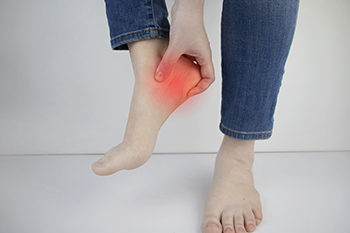
A band of tissue called the plantar fascia runs along the sole of the foot, connecting the toes to the heel. When this tissue becomes inflamed, it can result in pain in the foot, arch, and heel, and is a condition termed plantar fasciitis. Although the plantar fascia is built to absorb pressure, if too much is applied, the plantar fascia can tear. It is a common condition among walkers, runners, and other athletes, and is the most frequent complaint of heel pain. Symptoms can include a sharp or burning pain in the heel that feels worse when you get up in the morning but wears off after activity begins. Plantar fasciitis also can make lifting the toes off the ground more difficult. If the pain inhibits performing normal daily activities, or if it stops you from sleeping, it may be time to get medical help. Ignoring plantar fasciitis can lead to long-term heel pain. An X-ray or additional imaging tests can help to determine the cause and severity of the heel pain. If you think you may have plantar fasciitis, it is suggested that you make an appointment with a podiatrist who is trained to deal with this condition.
Plantar fasciitis can be very painful and inconvenient. If you are experiencing heel pain or symptoms of plantar fasciitis, contact one of our podiatrists from Livingston Footcare. Our doctors can provide the care you need to keep you pain-free and on your feet.
What Is Plantar Fasciitis?
Plantar fasciitis is the inflammation of the thick band of tissue that runs along the bottom of your foot, known as the plantar fascia, and causes mild to severe heel pain.
What Causes Plantar Fasciitis?
How Can It Be Treated?
While very treatable, plantar fasciitis is definitely not something that should be ignored. Especially in severe cases, speaking to your doctor right away is highly recommended to avoid complications and severe heel pain. Your podiatrist can work with you to provide the appropriate treatment options tailored to your condition.
If you have any questions please feel free to contact our office located in North Brunswick, NJ . We offer the newest diagnostic and treatment technologies for all your foot and ankle needs.
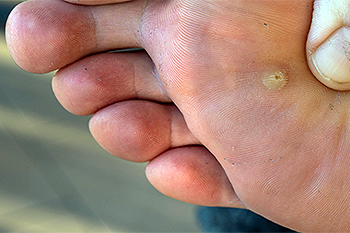
Despite the fact that plantar warts are harmless skin growths, they can produce severe pain. They grow inward and can produce discomfort as pressure is exerted while walking. They are considered to be contagious and may spread to other areas of the foot. Plantar warts can develop from exposure to a specific type of fungus, which is found in warm and moist environments. These can include public swimming pools, locker rooms, and similar areas. It is important to refrain from sharing towels, shoes and socks, and this may help to prevent the spread of plantar warts. Many people choose to seek relief from using over the counter remedies, despite this being a temporary fix. If you have a plantar wart, it is suggested that you speak with a podiatrist who can offer a more permanent solution, which may include minor surgery for removal.
Plantar warts can be very uncomfortable. If you need your feet checked, contact one of our podiatrists from Livingston Footcare. Our doctors will assist you with all of your foot and ankle needs.
About Plantar Warts
Plantar warts are the result of HPV, or human papillomavirus, getting into open wounds on the feet. They are mostly found on the heels or balls of the feet.
While plantar warts are generally harmless, those experiencing excessive pain or those suffering from diabetes or a compromised immune system require immediate medical care. Plantar warts are easily diagnosed, usually through scraping off a bit of rough skin or by getting a biopsy.
Symptoms
Treatment
To help prevent developing plantar warts, avoid walking barefoot over abrasive surfaces that can cause cuts or wounds for HPV to get into. Avoiding direct contact with other warts, as well as not picking or rubbing existing warts, can help prevent the further spread of plantar warts. However, if you think you have developed plantar warts, speak to your podiatrist. He or she can diagnose the warts on your feet and recommend the appropriate treatment options.
If you have any questions please feel free to contact our office located in North Brunswick, NJ . We offer the newest diagnostic and treatment technologies for all your foot and ankle needs.

When the tendon that attaches the calf muscle to the heel is completely torn, it is known as an Achilles tendon tear. This injury is often seen in middle-aged male sports participants. The Achilles tendon is the largest tendon in the body, and it is prone to injury, especially during sports involving running and jumping because sudden and explosive force is exerted on it. Certain antibiotics and cortisone shots can make one more apt to tear this tendon, and some medical professionals do not give cortisone shots for Achilles tendonitis for this reason. The main symptom of an Achilles tear is sudden and intense pain behind the ankle. Some who have sustained this injury have heard a popping or cracking sound and describe it as being kicked in the heel. There is often difficulty pointing toes down and some may experience swelling and bruising around the tendon. If you think you have torn your Achilles tendon, it is strongly suggested that you see a podiatrist as soon as possible for a proper diagnosis and treatment.
Achilles tendon injuries need immediate attention to avoid future complications. If you have any concerns, contact one of our podiatrists of Livingston Footcare. Our doctors can provide the care you need to keep you pain-free and on your feet.
What Is the Achilles Tendon?
The Achilles tendon is a tendon that connects the lower leg muscles and calf to the heel of the foot. It is the strongest tendon in the human body and is essential for making movement possible. Because this tendon is such an integral part of the body, any injuries to it can create immense difficulties and should immediately be presented to a doctor.
What Are the Symptoms of an Achilles Tendon Injury?
There are various types of injuries that can affect the Achilles tendon. The two most common injuries are Achilles tendinitis and ruptures of the tendon.
Achilles Tendinitis Symptoms
Rupture Symptoms
Treatment and Prevention
Achilles tendon injuries are diagnosed by a thorough physical evaluation, which can include an MRI. Treatment involves rest, physical therapy, and in some cases, surgery. However, various preventative measures can be taken to avoid these injuries, such as:
If you have any questions please feel free to contact our office located in North Brunswick, NJ . We offer the newest diagnostic tools and technology to treat your foot and ankle needs.
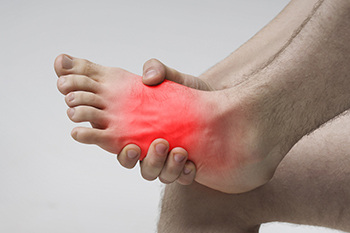
One of the most common causes of pain among athletes and runners are stress fractures. These hairline cracks in the bones of the feet can happen from repetitive force that occurs each time the foot strikes the ground. Stress fractures have also been linked to poor eating habits, consuming too much alcohol, and smoking. In most cases, stress fractures can begin to develop with a sudden increase in activity. For example, a runner may increase mileage in too short a period of time. If the feet are not given enough time to recover, the bones can become vulnerable by working too hard to absorb repetitive shock. Reduced levels of vitamin D and calcium also may weaken bones, causing them to be at risk of stress fractures. Ill-fitting shoes, running on hard surfaces, and poor technique are other causes of stress fractures. A major symptom of stress fractures is pain that continues after the activity ends and the foot is at rest. Tenderness and swelling are other common symptoms. For help with foot pain caused by stress fractures, it is suggested that you visit a podiatrist.
Activities where too much pressure is put on the feet can cause stress fractures. To learn more, contact one of our podiatrists from Livingston Footcare. Our doctors can provide the care you need to keep your pain free and on your feet.
Dealing with Stress Fractures of the Foot and Ankle
Stress fractures occur in the foot and ankle when muscles in these areas weaken from too much or too little use. The feet and ankles then lose support when walking or running from the impact of the ground. Since there is no protection, the bones receive the full impact of each step. Stress on the feet can cause cracks to form in the bones, thus creating stress fractures.
What Are Stress Fractures?
Stress fractures occur frequently in individuals whose daily activities cause great impact on the feet and ankles. Stress factors are most common among:
Symptoms
Pain from the fractures occur in the area of the fractures and can be constant or intermittent. It will often cause sharp or dull pain with swelling and tenderness. Engaging in any kind of activity which involves high impact will aggravate pain.
If you have any questions please feel free to contact our office located in North Brunswick, NJ . We offer the newest diagnostic and treatment technologies for all your foot and ankle needs.
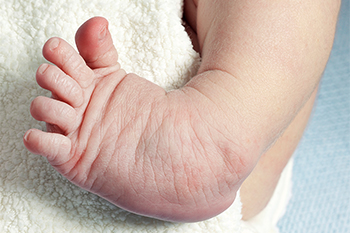
There are congenital foot conditions that can affect newborn babies. A common abnormality is referred to as metatarsus adductus and is visible by the curve in the middle of the foot. Additionally, calcaneovalgus is evident as the foot is pushed up and out, making it difficult to point the foot down. Many times these conditions can gradually improve without medical attention and are generally not considered to be serious. Examples of complicated congenital foot ailments include clubfoot and congenital vertical talus. They may look similar to metatarsus adductus, however, prompt medical attention is needed for permanent relief. Treatment can consist of using casts soon after birth that are replaced weekly, and this is referred to as the Ponseti method. If your child has been born with a foot abnormality, it is strongly suggested that you are under the care of a podiatrist who can help you to manage your child’s foot condition.
Congenital foot problems require immediate attention to avoid future complications. If you have any concerns, contact one of our podiatrists of Livingston Footcare. Our doctors can provide the care you need to keep you pain-free and on your feet.
Congenital foot problems are deformities affecting the feet, toes, and/or ankles that children are born with. Some of these conditions have a genetic cause while others just happen. Some specific foot ailments that children may be born with include clubfeet, polydactyly/macrodactyly, and cleft foot. There are several other foot anomalies that can occur congenitally. What all of these conditions have in common is that a child may experience difficulty walking or performing everyday activities, as well as trouble finding footwear that fits their foot deformity. Some of these conditions are more serious than others. Consulting with a podiatrist as early as possible will help in properly diagnosing a child’s foot condition while getting the necessary treatment underway.
What are Causes of Congenital Foot Problem?
A congenital foot problem is one that happens to a child at birth. These conditions can be caused by a genetic predisposition, developmental or positional abnormalities during gestation, or with no known cause.
What are Symptoms of Congenital Foot Problems?
Symptoms vary by the congenital condition. Symptoms may consist of the following:
Treatment and Prevention
While there is nothing one can do to prevent congenital foot problems, raising awareness and receiving neonatal screenings are important. Early detection by taking your child to a podiatrist leads to the best outcome possible.
If you have any questions please feel free to contact our office located in North Brunswick, NJ . We offer the newest diagnostic tools and technology to treat your foot and ankle needs.
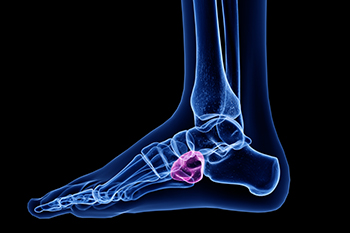
Cuboid syndrome involves lateral foot and ankle pain and is a disruption of the calcaneocuboid part of the midtarsal joint, which irritates the surrounding areas. The foot is made up of 26 bones, and the cuboid bone provides stability to the foot. This syndrome is thought to be from overuse, plantar flexion difficulties, and inversion ankle sprains. Athletes with foot injuries, particularly ballet dancers, can develop cuboid syndrome. Orthotics that are not constructed properly and heel spur surgery can also trigger the symptoms of this syndrome Because radiographic imaging does not detect this syndrome, it can be difficult to recognize, and can easily be misdiagnosed and mistreated. A diagnosis is based on history and symptoms. However, once properly diagnosed, it can respond well to conservative treatment that involves manipulation of the cuboid bone, exercises, and taping. If you have lateral foot and ankle pain that is persistent, it is suggested that you schedule an appointment with a podiatrist for a proper diagnosis and treatment.
Cuboid syndrome, also known as cuboid subluxation, occurs when the joints and ligaments near the cuboid bone in the foot become torn. If you have cuboid syndrome, consult with one of our podiatrists from Livingston Footcare. Our doctors will assess your condition and provide you with quality foot and ankle treatment.
Cuboid syndrome is a common cause of lateral foot pain, which is pain on the outside of the foot. The condition may happen suddenly due to an ankle sprain, or it may develop slowly overtime from repetitive tension through the bone and surrounding structures.
Causes
The most common causes of cuboid syndrome include:
Symptoms
A common symptom of cuboid syndrome is pain along the outside of the foot which can be felt in the ankle and toes. This pain may create walking difficulties and may cause those with the condition to walk with a limp.
Diagnosis
Diagnosis of cuboid syndrome is often difficult, and it is often misdiagnosed. X-rays, MRIs and CT scans often fail to properly show the cuboid subluxation. Although there isn’t a specific test used to diagnose cuboid syndrome, your podiatrist will usually check if pain is felt while pressing firmly on the cuboid bone of your foot.
Treatment
Just as the range of causes varies widely, so do treatments. Some more common treatments are ice therapy, rest, exercise, taping, and orthotics.
If you have any questions, please feel free to contact our office located in North Brunswick, NJ . We offer the newest diagnostic and treatment technologies for all your foot care needs.